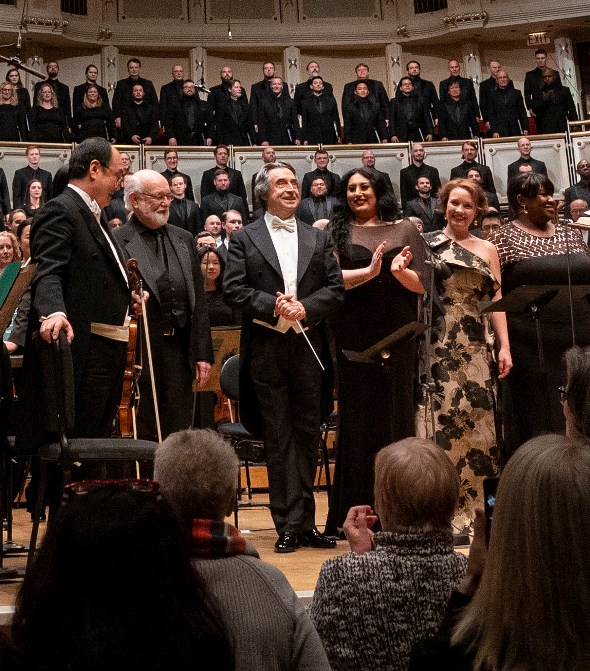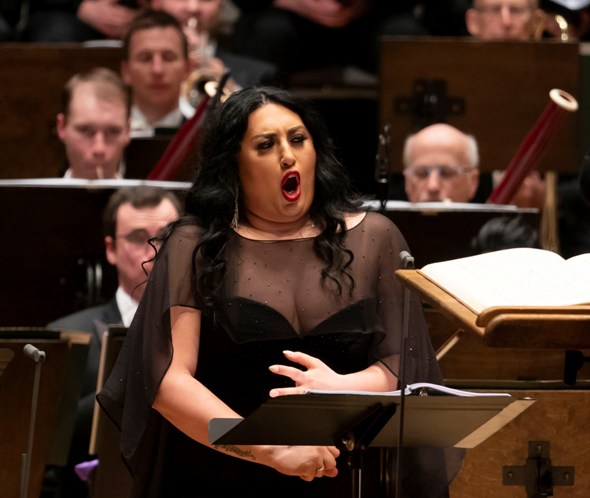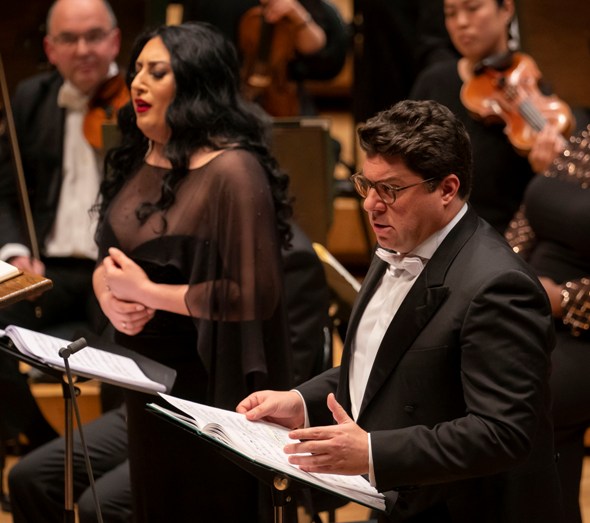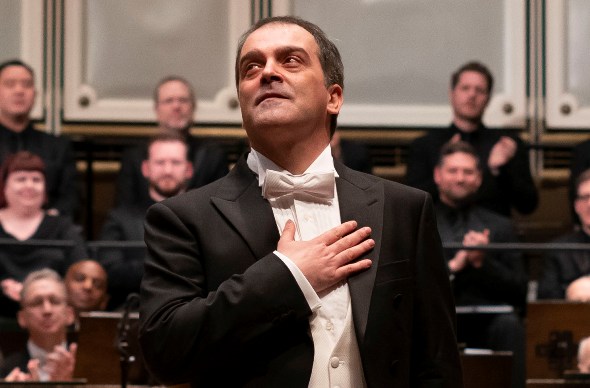Muti leads Chicago Symphony and stellar cast in concert ‘Cavalleria’ richly staged for the ear

Music director Riccardo Muti accepts applause with CSO chorus director Duain Wolfe to his right, mezzo-soprano Anita Rachvelishvili to his left, other ‘Cavalleria rusticana’ soloists and members of the Chicago Symphony Orchestra and Chorus. (Photos by Todd Rosenberg)
Review: “Cavalleria rusticana” by Pietro Mascagni; Chicago Symphony Orchestra and Chorus, Anita Rachvelishvili, Piero Pretti, Luca Salsi conducted by Riccardo Muti. Feb. 6-8 at Orchestra Hall.
By Nancy Malitz
Pietro Mascagni’s opera “Cavalleria rusticana” was such a worldwide sensation when it opened in 1890 that the work had crossed the ocean to Chicago already by 1891. Still, there is little doubt that its most recent concert run, led by music director Riccardo Muti and starring the sensational 36-year-old Georgian mezzo-soprano Anita Rachvelishvili amidst an outstanding cast, was a performance for the ages.
The sins of adultery and betrayal sear with almost unbearable heat in this opera, whose ironic title translates as “rustic chivalry.” For Muti, who was born in the Italian south, the verismo style not only runs in his blood but also gains nobility in the bargain. And at this point in his tenure as the CSO’s tenth music director, Muti might argue that his orchestra is part Italian, so undeniable is its lyrical sensibility and confidence in Muti’s native repertoire.
The opera’s story is set in a small Sicilian village on Easter Sunday, when the despairing Santuzza, excommunicated and guilt-ridden for taking a lover, discovers that this very same lover has betrayed her for a neighbor’s wife. The sound of Santuzza’s agony, which she confesses in the aria “Voi lo sapete,” is a glory that wells up to great heights from Rachvelishvili’s rare reservoir of baritonal depth.
The stakes for Santuzza are indeed grisly, given the church’s towering influence over its landscape of villagers’ transgressions. This is a close-knit community, where honor killings are custom, and no secret can be kept for long. With the ringing of church bells and the seraphic sounds of the elegant CSO Chorus still echoing in the mind’s ear, a gut-wrenching final scream announces yet another dread debt has been paid in tribute to ancient authority.
Luckily for Rachvelishvili, her particular mezzo-soprano voice type is in a category for which marvelously fierce roles have been written. Verdi’s vengeful gypsy Azucena in “Il trovatore” and his scheming princess Eboli in “Don Carlo” come to mind, as well as “Aida’s” jealous Egyptian princess Amneris, which Rachvelishvili sang with Muti and the CSO in 2019. She is also famous as Bizet’s femme-fatale gypsy Carmen, as well as Saint-Saëns’ Dalila, seducer of Samson.
But Rachvelishvili’s deeply troubled Santuzza is not only fierce. Her voluptuous voice has beauty and power unmatched in her niche. Yet it was the singer’s insight into the lonely woman’s vulnerability, disbelief and increasing desperation that took this concert performance into the realm of greatness. Even as her efforts intensify and her panic rises, Santuzza withers at the browbeating she takes from the flamboyant Turiddu – sung by Sardinian tenor Piero Pretti with suitablly reckless flair. Theirs was one of the concert’s two great musical stand-offs.
The other, even more calamitous, confrontation followed between suddenly fearful Turiddu and wronged Alfio, the latter embodied with acid fury by the baritone Luca Salsi. The commanding Salsi had performed the title role in Verdi’s “Macbeth” with Muti in 2013. He was electrifying here as the cuckolded husband with a grim immediate purpose. We are left with little doubt, given the plot’s trajectory, that the unfaithful Lola’s death will soon follow. Sasha Cooke, whose mezzo-soprano is as lovely, light and carefree as Rachvelishvili’s is dark and dangerous, played an appealing flirt, with mezzo-soprano Ronnita Miller as Turiddu’s kindly mother.
It was left to Muti, the chorus and orchestra to draw the exquisite picture of village life as a whole – first in an extended and justly famous symphonic intermezzo depicting the villagers’ leisurely wanderings after church, and then in a boisterous public gathering at which Turiddu sings his paean to the sparkling glass (“Viva il vino spumeggiante”).
The scene is also Mascagni’s beautifully crafted set-up for the story’s tragic denouement, which comes suddenly as a knife to the heart. No costumes were needed. Details were vivid in the mind’s ear, and Muti was in his authoritative element.
As thrilling as the visuals can be when a company’s full opera entourage is outfitted with costumes, blocked for movement, and framed in an enhancing onstage set, it has been rewarding to experience, during Muti’s tenure with the CSO, just how richly opera’s stories can be conveyed with music alone. Duain Wolle’s well-prepared CSO Chorus lent diaphanous grace to the opening reverie “Gli aranci olezzano sui verdi margini” (The orange trees in the green groves scent the air) and joyous warmth to Easter Sunday’s high holy “Regina coeli” (Queen of heaven rejoice). And the CSO sounded far more glorious in the “Cavalleria” intermezzo than is ever possible from a smaller ensemble trapped in an opera pit below the stage.
Will CSO patrons enjoy another full-length opera before Muti departs his music directorship? Next season’s crowning operatic soirée is vaguely characterized as something of a potpourri. That leaves his final season, with quite a bit from Verdi alone still left to choose from. Given Muti’s ability to draw the world’s finest singers, the superb level of the ensembles at his command, and the packed houses they draw, there’s reason to hope for at least one more.





